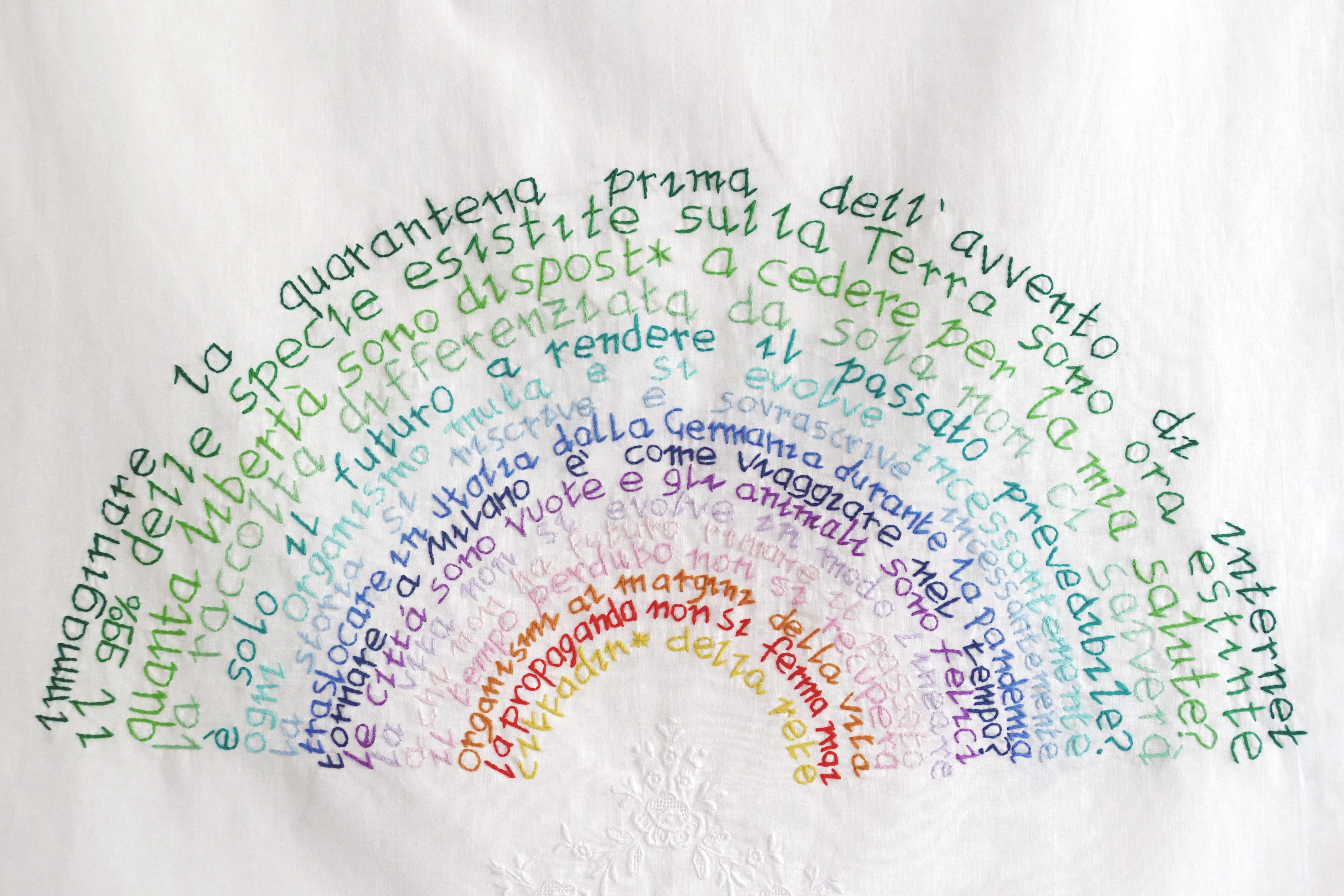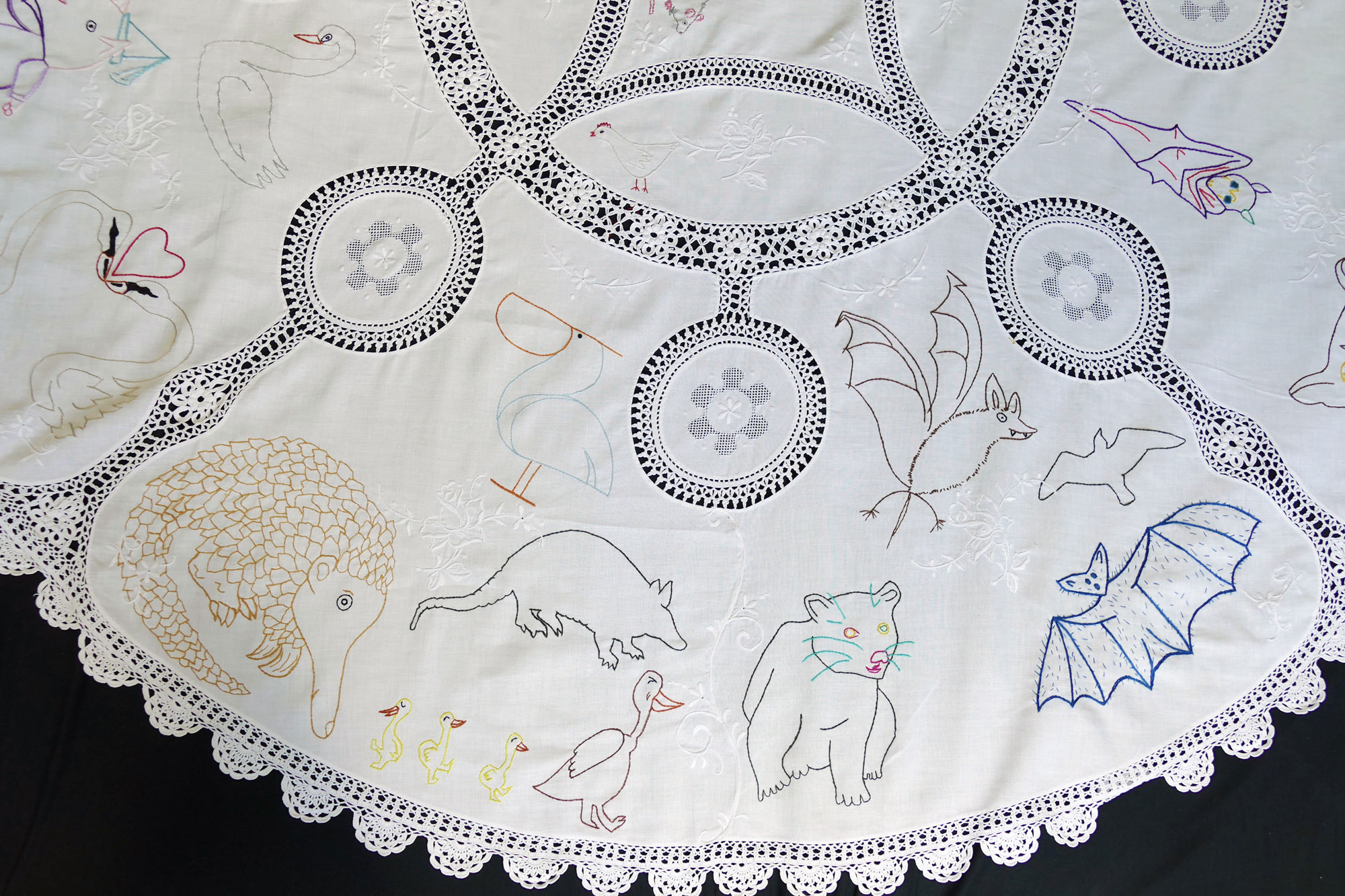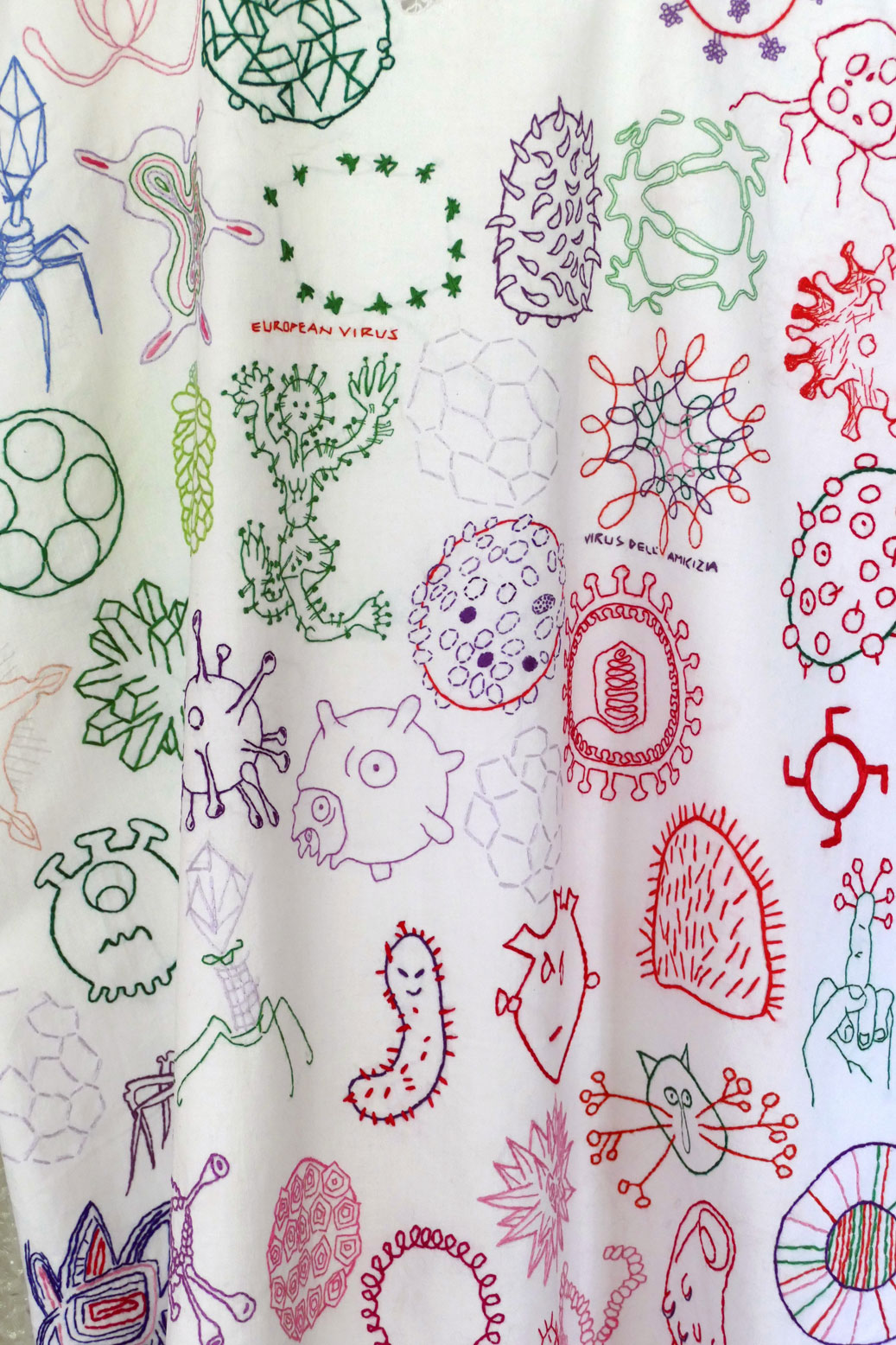| home rebecca agnes | books | texts | links | bio | cv |
scroll down for english und Deutsch Il mattino dell'otto marzo 2020 mi trovavo in una fattoria nel Brandeburgo, una vacanza pianificata da tempo con alcune amiche berlinesi. Mentre preparavo il caffè le news internazionali riportano della creazione della cosiddetta zona rossa in Lombardia ed in alcune altre province. Di fatto sono vietati gli spostamenti. Di DPCM in DPCM in pochi giorni tutta Italia é impermeabile, le frontiere sono chiuse. Per la prima volta nella mia esperienza i mille e passa chilometri fra Milano e Berlino divengono reali, non più una ora e mezza di volo economico e nessun controllo alla frontiera. Il mio passaporto, che da occidentale mi consente il privilegio di spostarmi liberamente in quasi tutto il mondo, é divenuto inutile. Sono a Berlino, città in cui risiedo, e posso solo guardare con angoscia quello che sta succedendo in Italia. |
 |
ITA / L'umanità è scomparsa, Serie di 5 ricami realizzati su tessuti regalatemi da mia mamma, e con fili da ricamo datemi dalle mie nonne Velleda Verri e Fiorenzina Margotti e dalla mia amica Steph. Il lavoro è iniziato nel mese di Aprile 2020 e si basa sulla collaborazione da remoto con altre persone - utilizzando quello che avevo in casa prima del lockdown fino ad esaurimento (ad esempio specifici fili colorati). A sinistra L'umanità è scomparsa I (dettaglio). Una serie di frasi in italiano ricamate a mano su una tenda di cotone ricamata, 73 x 109 cm. 2020. Si tratta di una collezione di frasi mie personali. L'umanità è scomparsa II. Tovaglietta ricamata a mano, 85cm di diametro, fili colorati, 2020. I disegni ricamati sono miei e dell*a mi*a partner. In questa tovaglietta circolare sono disegnati gli animali che abbiamo visto (on-line) correre felici nelle strade deserte della città, o semplicemente comparire in luoghi in cui non andavano più a causa della presenza umana. Animali felice perché gli uomini sono assenti. Guardando tutti questi animali gioiosi, mi prende sempre un senso di colpa, perché le città sono deserte solo temporaneamente, e prima o poi l'uomo tornerà a riprendersi tutto lo spazio possibile. E' con l*a mi*a partner che consumo tutti i pasti durante il lockdown, a volte in cucina, a volte in soggiorno e se il tempo permette sul balcone. L'umanità è scomparsa III, Disegni ricamati su tovaglia 150cm di diametro ricamata, 2020. Cotone, fili colorati. Contributi in ordine sparso dei mie famigliari: Anita, Marisa, Lorenzo, Melissa, Emma, Irene, Bruno, Sylvia, Roberto, Helga, Rajko, Henning. La mia famiglia al momento è divisa fra Berlino, Brighton, Pavia e Roma. Ho fornito ai miei famigliari un elenco di animali che "causano" la diffusione di virus (Zoonosi). Rispettare gli ecosistemi selvatici ed evitare di mangiare carne sarebbero due strategie vincenti per debellare molti virus. Il ricamo è fatto su una grande tovaglia circolare, un elemento che richiama la convivialità negata dal confinamento sociale. Come un grande pranzo di famiglia che non è accaduto nel mondo reale, ma nell'ideale grazie ad internet e allo smartphone. L'umanità è scomparsa IV. (dettaglio) Ricamo a mano su camicia da notte ricamata appartenente alla mia bis-nonna Maria Fietta. Cotone e fili da ricamo provenienti da mia mamma, le mie nonne e da una mia amica. Esisterebbero almeno 320.000 virus potenzialmente in grado di colpire i mammiferi, a cui si aggiungono quelli che colpiscono anche altri verte- brati, invertebrati, piante, licheni, funghi e alghe. Ho chiesto ad amiche ed amici di mandarmi un disegno di un virus (reale o immaginario). Avendo finito quasi tutti i tessuti di cotone, ho pensato di utilizzare questa camicia da notte. Attraverso il ricamo è divenuta un abito che trasporta vari tipi di Virus, analogamente a come succede con gli esseri umani, trasportatori di queste entità invisibili. Ma anche una raccolta delle persone con cui nonostante tutto sono sempre in contatto.
|
 |
ENG / Humanity has disappeared, Series of 5 embroideries on fabrics given to me by my mother, and with embroidery threads given to me by my grandmothers Velleda Verri and Fiorenzina Margotti and by my friend Steph. The work started in April 2020 and is based on remote collaboration with other people - using what I had at home before the lockdown until exhausted (for example specific colored threads). On the left < Humanity has disappeared I (detail). A series of hand-embroidered sentences in Italian on an embroidered cotton curtain, 73 x 109 cm. 2020. This is a col- lection of my personal reflections/sentences. Humanity has disappeared II. Hand embroidered tablecloth, 85cm in diameter, colored threads, 2020. The embroidered designs are mine and of my partner. This circular tablecloth depicts the animals that we have seen (online) running happily in the deserted streets of the city, or simply appearing in places where they no longer go due to human presence. Ani- mals happy because men are absent. Looking at all these joyful animals, I always feel a sense of guilt, because the cities are deserted only temporarily, and sooner or later man will return to take back all the space possible. It is with my partner that I eat all meals during the lockdown, sometimes in the kitchen, sometimes in the living room or on the balcony if the weather permits. Humanity has disappeared III, Embroidered tablecloth 150cm diameter, 2020. Cotton, colored threads. Contributions from my family: Anita, Marisa, Lorenzo, Melissa, Emma, Irene, Bruno, Sylvia, Roberto, Helga, Rajko, Henning. My family is currently divided between Berlin, Brighton, Pavia and Rome. I have provided my family with a list of animals that "cause" the spread of viruses (Zoonosis). Respecting wild ecosystems and avoiding eating meat would be two winning strategies for eradicating many viruses. The embroidery is done on a large circular tablecloth, an element that recalls the conviviality denied by social confinement. Like a big family lunch that didn't happen in the real world, but only virtually - thanks to the internet and smartphone. Humanity has disappeared IV Hand embroidery on an embroidered night-gown belonging to my great-grandmother Maria Fietta. Cotton and embroidery threads from my mom, my grandmothers and a friend of mine.
|
DE/ Die Menschheit ist verschwunden, Serie von 5 Stickereien auf Stoffe. Diese Arbeit entstand während des ersten Lockdowns in Berlin im Jahr 2020. Um sie zu realisieren, beschloss ich, die Materialien zu verwenden, die ich zu Hause zur Verfügung hatte: einen Vorhang, 2 Tischdecken, die mir meine Mutter geschenkt hatte, und 2 Nachthemden, die meiner Urgroßmutter gehörten. Diese Stoffe wurden zur Grundlage für eine Serie von fünf Stickereien, die auf der Zusammenarbeit mit anderen Menschen basieren – die zu der Zeit mit mir zusammenlebten (mein*e Ehe-Partner*in) oder weit entfernt und unerreichbar waren (Familie und Freund*innen). Ein Teil der Arbeit reflektiert, was Nachhaltigkeit in der künstlerischen Produktion bedeuten könnte, wobei besonderes Augenmerk auf die Wiederverwendung gelegt wird, sowie auf die Zirkulation von Materialien an die Orte, wo sie benötigt werden. Die Menschheit ist verschwunden III, bestickte Tischdecke, 150 cm Durchmesser, Baumwolle, farbige Fäden. 2020. Im Jahr 2020 war meine Familie auf die Städte Brighton, Pavia, Rom und verschiedene Viertel Berlins verteilt. Ich habe meinen Verwandten eine Liste von Tieren zur Verfügung gestellt, die die Übertragung von Viren auf Menschen „verursachen“ (Zoonosen). Der Respekt vor wilden Ökosystemen und der Verzicht auf Fleisch wären zwei erfolgreiche Strategien zur Ausrottung vieler solcher Viren. Ich bat die Mitglieder meiner Familie eines dieser Tiere zu zeichnen und mir ein Bild davon zu senden. Die Fotos der Zeichnungen übertrug ich dann auf eine Tischdecke. Das Ergebnis ist eine Stickerei auf einer großen runden Tischdecke, ein Element, das an die Geselligkeit erinnert, die durch die soziale Isolation verhindert wird. Wie ein großes Familienessen, das nicht in der realen Welt stattfand, sondern nur virtuell – dank Internet und Smartphone. Beitragende: Anita, Marisa, Lorenzo, Melissa, Emma, Irene, Bruno, Sylvia, Roberto, Helga, Rajko, Henning. |
 |
| home rebecca agnes | books | texts | links | bio | cv |